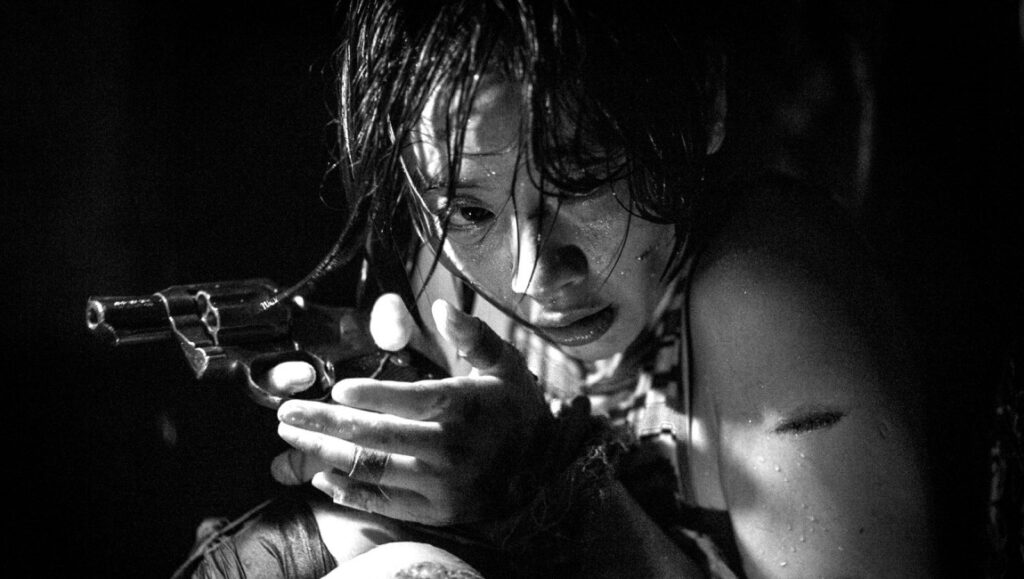Photography is the first sign that Soi Cheang’s Limbo is different from the director’s past work. Though his return to Hong Kong was bound to retreat from the CGI spectacle of his Mainland-produced Monkey King movies, the stark, extremely high-contrast black-and-white images immediately set it apart from even his more grounded, generally excellent Hong Kong films. This is a film concerned with grime, one that envisions Hong Kong as a labyrinth of garbage-strewn alleyways bursting with junkies, criminals, and hard-edged cops, a region at war with itself in a purgatorial relationship to the Mainland (hence, Limbo), and it’s a film which weaponizes its look to convey its murky theme. Black seems somehow darker than it ever has, as if every cop’s coat or discarded garbage bag was painted onto the screen, and even the lighter parts of the image feel oppressive, like a grayscale molasses through which the film’s cops and drug addicts trudge. Limbo is another impressive work from Cheang, further confirmation that he might be the best Hong Kong genre filmmaker not named Johnnie To, but it is also frustratingly grim, the work of a filmmaker who looks at Hong Kong and hates what he sees. But his vision is too clouded by an incoherent reactionary streak to lead anywhere but the gutter.
Cham Lau (Gordon Lam) is a grizzled, violent police detective on the hunt for a serial killer who’s been leaving severed hands in heaps of trash. Young, by-the-book hotshot Will Ren (Mason Lee), whose youthful naivety is cleverly mirrored by his incoming wisdom tooth — literal growing pains — plays the good cop to Cham’s bad, venturing with him into dark alleys and pleading with him to stop brutalizing their guide, Wong To (Yase Liu), an ex-con whose shared past with the older detective is leveraged against her, turning her into an unwilling informant. There’s plenty of action, all the chases and fights well-directed by Cheang, whose best trick here is an overhead shot that tracks the movements of his characters in mazes of trash, and the procedure of the investigation remains compelling throughout thanks to the director’s masterful tonal control. But watching the continual brutality visited upon Wong To, who is not much of a character despite Liu’s good work, quickly becomes numbing, and the film’s eventual locating of social rot within extreme poverty, mental illness, and immigration comes off as cheap and unenlightening.
That’s not to say Cheang lets institutions off the hook, just that his approach to social criticism is one of full coverage and anger mistaken for insight, but his vision of the police as brutal, power-obsessed assholes doing much more harm than good fares much better than his rote take on drug dealers. In one scene, Ren’s search for his dropped pistol proves to be a shortsighted search to reclaim his power; the murderer he’s looking for walks past him unnoticed, putting the people Ren’s meant to be protecting in grave danger. His adherence to protocol (see: Stray Dog or PTU for more on missing weapons) and the fear of relative powerlessness renders him blind to what he’s actually looking for. He is hardly better than his partner, a cop who gets results through brazen indifference and wanton cruelty, willfully putting Wong To in danger whenever not beating her himself. These are the two forms of policing in Limbo, inexperienced adherence to stricture and plain mean brutality.
More than a decade ago, Cheang made Accident, a thriller of dazzling economy that trafficked in paranoid ambiguity until it pulled the rug out with a bleak, unflinching ending. Now, years and several movies removed, the filmmaker skips the ambiguities and heads straight toward the doom. Totally uncompromised in its relentless grimness, Limbo is the first of Cheang’s films that is hard to like, frustrating in its messaging and its misogyny, but one that is still harder to shake, the pessimistic work of one of Hong Kong’s very best.
DIRECTOR: Soi Cheang; CAST: Lam Ka-tung, Liu Yase, Mason Lee, Hiroyuki Ikeuchi; DISTRIBUTOR: Capelight Pictures; IN THEATERS & STREAMING: September 29; RUNTIME: 1 hr. 58 min.
Originally published as part of NYAFF 2021 — Dispatch 2.


Comments are closed.